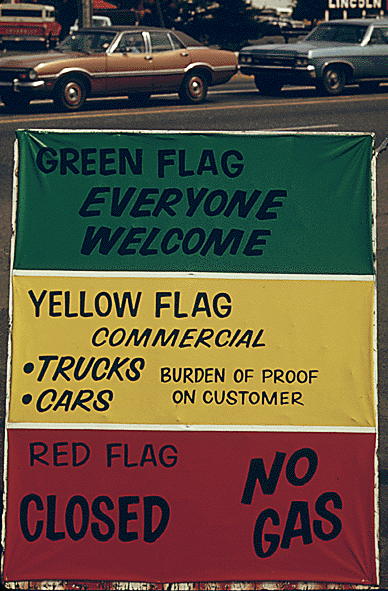Socialized gasoline: The bureaucratic miracle of Vehicle-to-Grid

Imagine a world where Shell Oil is running out of gasoline for the week and needs more in order to keep some of their biggest clients’ fleets running. So they go around to every home in the neighborhood overnight, siphon off half of the gasoline they find in everyone’s car, maybe leave a couple of bucks on the doorstep, and then sell that gasoline to their clients.
You wake up in the morning and need to get somewhere, but your car doesn’t have enough gasoline and all you have is some money to refill it—but how do you get it refilled in time?
Wind-generated electricity has a lot of problems. One of the biggest is how unreliable it is. Because of that unreliability, and because it doesn’t generate a whole lot of power to begin with, it is best used to supplement existing power sources, but unfortunately wind tends to be most abundant when supplemental energy is least needed—at night.
Storing wind energy for later use means massive arrays of batteries, but batteries come with their own problems, mainly that they need to be recycled and replaced often; wind energy is already environmentally iffy enough and on the edge of being too costly to be worth it; add in the need to safely dispose of the hazardous chemicals in batteries and the cost of replacing batteries regularly, and it rarely makes economic sense to replace fossil fuels with wind.
Somewhere along the line, someone must have had the brilliant idea of finding a way to take batteries off of the books. I suspect initially it went something like, make homeowners and renters pay for the batteries and their replacement; and then the costs can be ignored as just another part of buying property.
But how to convince people to pay the massive expense and time of buying huge batteries, maintaining them, and properly disposing of them?
I wonder when the first person tasked with solving that problem took a look at the battery arrays used in electric cars and had a light bulb go off.
On the surface, using electric cars to make use of wind energy isn’t that bad of an idea. For most people, after all, electric cars need to be charged up overnight, contrary to most other power uses. It’s very much a solution (wind energy) in search of a problem (cars that take lengthy times to “fill” in order to make short trips) but it makes a vague amount of sense as long as you don’t look too closely at it and its alternatives.
But who but a bureaucrat could decide it’s a good idea to pull power back from cars and into the grid? That’s the concept known as “Vehicle to Grid”. As a voluntary project it’s the kind of distributive thinking that could make power more reliable—if it could be designed simply, which it almost certainly can’t. As a top-down requirement, it’s the kind of centralized thinking that makes big government the pejorative it is. To make it more palatable, they’ve even had to rename your vehicle: you no longer drive a car, you drive a Mobile Energy Resource in Grids of Electricity. The hope, I’m guessing, is that you don’t start thinking about how you’ll need to replace your battery even more often because it’s going through more cycles.

To my knowledge, these coupons were never used, only contemplated. It would have been a lot easier if they could just pull the power back.
EV can potentially be an attractive form of responsive demand that can be used to provide operation flexibility. It has to be noted that this new type of flexibility will compete with other conventional sources of flexibility (flexible generation, transmission, storage and other flexible demand). This flexibility takes a more prominent role due to forecast uncertainties and variability related to intermittent generation (as wind) and demand, which are expected to increase the need for flexibility in future power systems.
Some people seem to think this is a connected conspiracy: that electric cars are being pushed specifically to push the battery costs of wind power onto consumers. I doubt it. The logic seems to run that subsidizing electric cars is a bad idea, so there must be some deeper reason for it, and that deeper reason is to shore up the bad idea of subsidizing wind energy. But Occam’s razor says that if governments are willing to implement one bad idea for no good reason, there’s no need to come up with convoluted reasons for why they’re implementing other bad ideas.
It will also grant whoever controls the grid the power to control mobility. For the plan to work, they need to “control EV charging to shift demand from peak to off-peak and reducing the charging power”. They need the ability to control when charging happens built into your car and the electrical grid. The charging systems will need “communication protocols etc.” to enable central control.
The development of these solutions requires a strong engagement of several parties, such as government, regulatory and standardization bodies, power system utilities, automobile manufacturers, etc.
Note who’s missing from that list, consigned at best to “etc.” Centralization is always going to provide centralized bureaucracies with opportunities for control, something that centralized bureaucracies are always on the lookout for. And once the power exists, it’s going to be used. Given the power to do wrong, a centralized government bureaucracy will always take it. Vehicle-to-grid will inevitably be used to take power—both kinds—from the less-connected and give it to the more-connected.
battery-powered cars
- Beware the wrong kind of Leafs on the road: Christopher Booker
- “So why are the Government and the BBC so keen on these absurd vehicles? The answer, astonishingly enough, can be dug out from a sheaf of EU documents showing that one of the chief reasons why it and the European Investment Bank are pouring five billion euros into research and development of electric vehicle technology, is the fond belief that this can provide a miraculous solution to one of the major drawbacks of that other obsession of the EU, the need for Europe to generate ever more of its electricity from those equally useless and ludicrously expensive wind turbines.”
- List of identified barriers and opportunities for large scale deployment of EV/PHEV and potential solutions: Vera Silva and Marko Aunedi
- “EV as a demand or storage resource could provide additional flexibility to the electricity system, but some power systems need more flexibility than others, depending on the generation mix and transmission network capacities.”
- MERGE Concept
- “Furthermore, if a bolder strategy is embraced, the potential benefits from large adoption of EV are even greater. The EV are then regarded not as just loads, but also as dispersed energy storage that can be used in ancillary services provision, decreasing traditional primary and secondary reserve needs, helping to manage congestion in some grids by shaving peak loads and by improving system dynamic behaviour in normal and emergency conditions. In this case one says that the Vehicle-to-Grid (V2G) concept is adopted including provision of additional revenue for vehicle owners.”
- Smart grids and electric vehicles: made for each other?: Trevor Morgan
- “The ownership of the vehicle battery will have a significant impact on whether owners opt to make available V2H or V2G supply. The EV owner may be more inclined to supply V2G power if he leases the battery for a fixed monthly fee, as he would be less concerned about how it might affect the life and reliability of the battery than if he owned it outright.”
- Vehicle-to-grid at Wikipedia
- “Vehicle-to-grid (V2G) describes a system in which plug-in electric vehicles, such as electric cars (BEVs) and plug-in hybrids (PHEVs), communicate with the power grid to sell demand response services by either delivering electricity into the grid or by throttling their charging rate.”
wind power
- Corporate Welfare for Energy Companies Should Have Gone Off the Cliff: Nicolas Loris and Katie Tubb
- “If the wind farms were truly economically competitive, they should be financeable without the generous support of taxpayers. Instead, the quote speaks to the level of dependence on the subsidy that some in the industry have reached. Rather than innovating to lower the cost of their power, companies spend more financial and human resources lobbying to receive these extensions.”
- Wind-power subsidy spared cuts: Ben Wolfgang
- “‘Cliff’ deal included extension.”
More battery-powered cars
- Lazlo Hollyfeld on the electric car
- The problems with electric cars are insurmountable without completely new battery technology that no one who wants to mandate battery-powered cars is looking for. Almost as if the real purpose of electric cars is not transportation, but anti-transportation.
- What will a useful electric car look like?
- New technologies win by being better than previous technologies, not worse. The modern battery-powered car is ridiculously close to its turn of the century counterpart. They may look more modern, but the same hundred-year-old technology that has never met the needs of drivers still powers them and hobbles them.
- Zeno’s motorcar
- Automobiles are awesome machines. But sometimes it seems as though they’re stuck twenty years in the past.
More cars of the future
- Who wants a driverless car?
- Anybody who can’t parallel park, or who has to juggle work, kids, and maintenance, or who sometimes needs a car and sometimes a truck, that’s who. The question isn’t who wants to lose the steering wheel. It’s who wants to gain fully-configurable travel devices.
More corporate cronyism
- Business prospect incentives discourage innovation
- Complicating the law and raising taxes, then lowering them for businesses that know how to lobby local or state governments, is not a recipe for encouraging innovation. It is a recipe for killing it.
- Atlas Shrugged II: The Strike
- I just saw the second part of the Atlas Shrugged trilogy. It is amazing.
- Crony vs. Crony
- The voters will look up and shout “save us!” History will look down, and whisper “no”.
- Why is the media saying Sanders lost the debate?
- Bernie Sanders spoke an important and inconvenient truth about socialism when he came to Hillary Clinton’s defense at the debates.
- The Parable of the Primary
- If Republicans are looking to be more Obama than Obama, they couldn’t have found a better cronyist than Donald Trump.
- 15 more pages with the topic corporate cronyism, and other related pages
More wind power
- Deadly complications of government bureaucracy
- Government monopolies, whether government agencies or de facto government agencies in the form of government-sponsored enterprises, aren’t rewarded by getting product to the people who need it. They’re rewarded by kissing up the bureaucratic chain.
- Rolling blackouts keep following me around
- Rolling blackouts in San Diego, the Great Southwest Blackout, and now Texas with a week of subfreezing temperatures and dead power.
